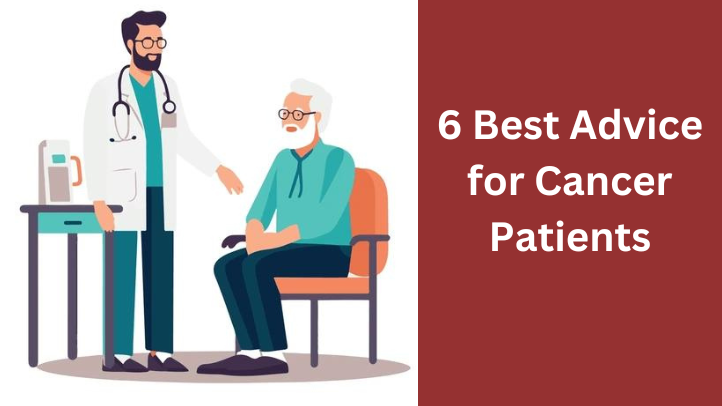Blog

6 Best Pieces of Advice for Cancer Patients – Without a doubt, one of the most difficult and life-changing events anyone can go through is being diagnosed with cancer. Even after treatment is over, returning to “normal” can seem impossible. Life after cancer treatment? For sure if full of trouble. Your life may never be the same again as before. But you can still live a healthy, happy, and normal life by coping with the cancer diagnosis. The journey after cancer can be complicated by doubt, fear, and many mental, emotional, and financial obstacles. Despite the challenges, there are important tips that can help cancer patients manage their condition, maintain a positive attitude, and improve their overall health. Today, we will look at the 6 best pieces of advice for cancer patients to help them face their journey with determination and resilience.
People with cancer need to eat foods rich in nutrients (including protein, fat, carbohydrates, vitamins, and minerals) regularly. Cancer patients often experience changes in their appetite, taste preferences, and digestive system due to the disease and treatment, which can affect their ability to consume nutritious foods. However, a balanced diet that includes a variety of fruits, vegetables, lean proteins, and whole grains can help improve their overall health and maintain their strength. Be sure to drink plenty of water during treatment as Diarrhea, vomiting, and other chemotherapy side effects can leave you feeling dehydrated, not only can this deplete your energy levels; but it can also lead to other health issues. You should also limit your intake of processed foods, sugar, and alcohol, and stay hydrated during cancer treatment. It is best to consult with an oncology dietitian to get a meal plan tailored to your needs.
A personalized data package can help individuals maintain optimal weight, strength, and energy levels to cope with aggressive cancer treatments. It can also provide the nutrients needed to support normal body function, boost the immune system to fight infections and help manage side effects. Ultimately, eating a healthy, balanced diet and keeping yourself hydrated can help cancer patients feel better and support their overall health and well-being.
Do not use mouthwash that contains alcohol. Do not use tobacco products and avoid passive smoking. Smoking is linked to many types of cancer, including cancer of the lungs, mouth, throat, larynx, pancreas, bladder, cervix, and kidney. Just being exposed to secondhand smoke can increase your risk of lung cancer. But it’s not just smoking that’s harmful. Tobacco is injurious to health and has been linked with cancers of the mouth, throat, and pancreas. Avoiding tobacco and smoking is a crucial step to prevent cancer. For help quitting smoking, ask your health care professional about anti-smoking products and other ways to quit smoking.
Exercise is a physical activity that improves or maintains overall fitness and health. It is done for a variety of reasons, including weight loss or weight maintenance, to promote growth and improve strength, to build muscle and the cardiovascular system, to improve health, or simply for fun.
Regular exercise can reduce the risk of cancer recurrence, improve physical function including strength, endurance, and flexibility, and minimize treatment side effects such as fatigue and depression, reduce the risk of chronic diseases such as heart disease, diabetes, and osteoporosis, which are common in cancer survivors, improve mental health and reduce stress and anxiety, improve overall quality of life, and promote good sleep.
A study shows that for most people, exercise could help patients before, during, and after cancer treatment. It can help improve your quality of life and the energy you have to do the things you enjoy. Physical activity can also help you cope with the side effects of treatment and may reduce your risk of developing new cancers in the future. Many cancer care teams encourage their patients to be as physically active as possible before, during, and after cancer treatment.
Due to the side effects of treatment and changes in routine that a cancer diagnosis can bring, weight can be a difficult issue for many survivors. Additionally, body shape can naturally change after cancer. But controlling weight is the correct way to improve overall health and quality of life. Regular exercise and activities you enjoy doing the most may also help. People who exercise during treatment not only tolerate side effects better but may also live longer. Exercise can increase endorphins, which make you feel good, and adrenaline, which gives you energy throughout the day. Start today with small steps and activities for patients who don’t exercise regularly.
A cancer diagnosis can be life-changing, but it does not define who you are or what you are capable of. You can manage your cancer experience with greater strength and resilience by creating a strong support network, educating yourself about cancer, prioritizing self-care, working effectively with your healthcare team, and emphasizing positivity and exercise. You can seek help from an experienced oncologist and cancer support group and talk openly about your feelings, which will help you stay positive.
Copyright © 2025 Dr Ahuja Clinic. All Rights Reserved | Marketing by : WebHopers
Website Design by CSW Technologies